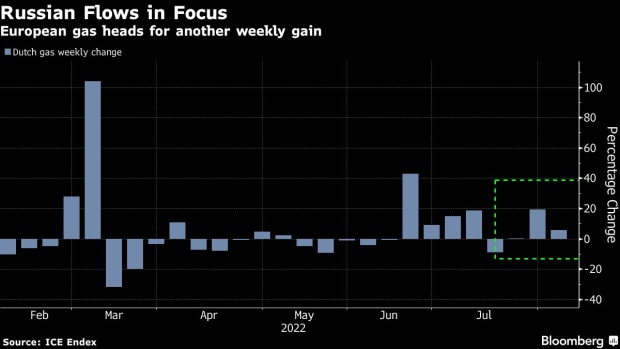Aug 5, 2022
European Gas Set for Another Weekly Gain on Russia’s Supply Grip
, Bloomberg News

(Bloomberg) -- European natural gas posted a third weekly advance as persistent concerns over Russian supply heighten the risk of shortages.
Benchmark futures slipped on Friday, but still gained 2.8% for the week. Prices surged after Moscow last week slashed supplies through the key Nord Stream pipeline to just 20% of its capacity, citing issues with equipment. Kremlin insiders have privately said that the cuts are to pressure the European Union over sanctions on Russia, while Berlin has repeatedly said it sees no technical reasons for the reduced flows.
The cuts are reverberating through Europe, lowering industrial output, driving up inflation to the highest in decades and threatening to push major economies into recession. The EU has been racing to stockpile gas for the winter, cutting fuel consumption and boosting imports of liquefied natural gas. The bloc has filled about 71% of its storage sites, in line with the five-year average, which has helped keep prices from rising even further.
For now, LNG supplies “have been exceptionally high” and gas stockpiles in northwest Europe are on track to reach 90% full by end-October, analysts at Goldman Sachs Group Inc. said in a note. “But we expect Asian competition for cargoes to drive volumes down in the fall.”
Dutch front-month gas, the European benchmark, settled 1.5% lower at 196.32 euros per megawatt-hour. The UK equivalent contract also fell 1.5% but still rose for a third week.
International competition for fuel has increased since Russia’s invasion of Ukraine upended global trade flows, boosting costs of spot LNG and coal to records this year.
“With no easy path to meeting Europe’s rising call on LNG, we expect global prices to remain elevated and volatile,” Morgan Stanley analysts said.
Read also: Keeping Europe Warm This Winter Comes Down to Asia’s Weather
Turbine Saga
One of Nord Stream’s turbines -- critical to boosting flows through the link -- is still in Germany following repairs in Canada, amid a stand-off over its return to Gazprom PJSC. The Kremlin said Thursday that it would like to get the unit back, but the company needs documents to show that it isn’t subject to international sanctions. Three more turbines, that are still in Russia and need maintenance, could be subject to the same sanctions risks, according to Gazprom.
“Anything that the Russians are saying on this is basically an excuse not to provide gas to the European Union,” said Eric Mamer, spokesman for the European Commission. “Of course, there is blackmail on the side of Russia when it comes to the supply of energy.”
Traders also remain on edge as several gas facilities that are crucial for Norwegian supplies to the UK and continental Europe, are scheduled to start seasonal maintenance next week. The works would add to the market’s tightness.
©2022 Bloomberg L.P.






